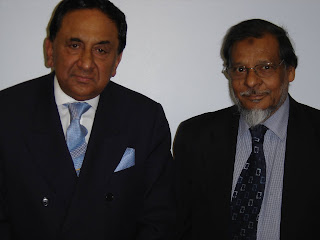Lord Sheikh Suggests Further Study
on Muslim Prisoners
Dr Mozammel Haque
Recently
Lord Sheikh of Cornhill spoke on the Treatment of Muslims in the House of Lords
and after that we had further discussion on Muslim prisoners via email.
Through
email, Lord Sheikh told me: “In regard to Muslim
prisoners I feel that we should undertake a study to look at the following
issues:
Why there are so many Muslims in prisons
How are the prisoners treated by the staff?
Are they properly rehabilitated after they leave prisons?
To what extent do they re-offend?”
He also said, “I am writing to Lord Greenhaigh the Minister
for Housing, Communities and Local Government to find out if the Government can
support such a study.”
Earlier, Lord Sheikh was speaking in the House of Lords on
Lammy Review. He said,
“My Lords, 41% of children in prisons are from the BAME
community, and a large number of them are Muslims. About 15% of prisoners are
Muslims, and in London, the figure is 27%. Some of those Muslims have been
victimised by the staff. The custodial sentences imposed on those from BAME
communities can be up to 10 years longer than those applied to white
people—several lawyers have said this to me.”
He also mentioned, “There is an appalling lack of diversity
in our judiciary, from the magistrates’ courts to the Supreme Court. Only 7% of
judges are from BAME communities, and the figure for magistrates is 12%. Stop
and search in BAME communities has risen by 69% for the last five years. I have
been stopped by police for allegedly using a phone, which was not so. A
sergeant then turned up and said that if there was any difference of opinion
between me and his officer, he would believe the officer. I was appalled by the
closing of ranks. I believe that I was picked upon because I was driving a
Bentley coupé with a personalised number plate. Can the Minister comment on my
points?”
In reply to that, The Advocate General for Scotland, Lord
Keen of Elie said, “My Lords, we are of course concerned about ensuring visible
diversity across the entire justice system. That is particularly challenging in
the judiciary and magistracy, and we have introduced an education programme for
those from backgrounds not properly represented to undertake training in order
that they can apply. Further across the criminal justice system, I note that we
have made progress. For example, with the Parole Board, there was grave
underrepresentation of BAME members, but we reported in February this year that
53 independent members would join the board, 48% of whom are from a BAME
background.”


No comments:
Post a Comment